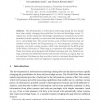Free Online Productivity Tools
i2Speak
i2Symbol
i2OCR
iTex2Img
iWeb2Print
iWeb2Shot
i2Type
iPdf2Split
iPdf2Merge
i2Bopomofo
i2Arabic
i2Style
i2Image
i2PDF
iLatex2Rtf
Sci2ools
163
click to vote
FROCOS
2009
Springer
2009
Springer
Combining Nonmonotonic Knowledge Bases with External Sources
The developments in information technology during the last decade have been rapidly changing the possibilities for data and knowledge access. To respect this, several declarative knowledge representation formalisms have been extended with the capability to access data and knowledge sources that are external to a knowledge base. This article reviews some of these formalisms that are centered around Answer Set Programming, viz. HEX-programs, modular logic programs, and multi-context systems, which were developed by the KBS group of the Vienna University of Technology in cooperation with external colleagues. These formalisms were designed with different principles and four different settings, and thus have different properties and features; however, as argued, they are not unrelated. Furthermore, they provide a basis for advanced knowledge-based information systems, which are targeted in ongoing research projects.
Answer Set Programming | Control Systems | FROCOS 2009 | Knowledge Representation Formalisms | Modular Logic Programs |
Related Content
| Added | 26 May 2010 |
| Updated | 26 May 2010 |
| Type | Conference |
| Year | 2009 |
| Where | FROCOS |
| Authors | Thomas Eiter, Gerhard Brewka, Minh Dao-Tran, Michael Fink, Giovambattista Ianni, Thomas Krennwallner |
Comments (0)

